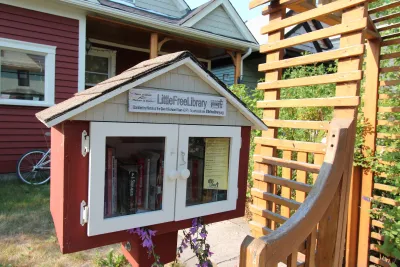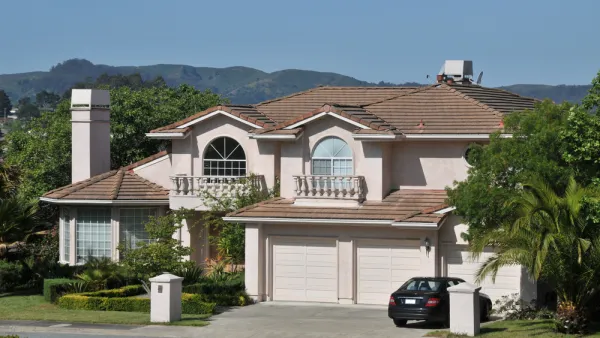The Little Free Library movement is a well-intentioned overture to literate neighborliness. In spite of lacking obvious drawbacks, certain officials argue it should undergo more stringent permitting.

Conor Friedersdorf asks the simple question: why must they pick on the Little Free Library? These freestanding wooden boxes, cozily situated on private property to encourage impromptu book sharing, have drawn the gaze of city regulators. Citing safety statutes, they say Little Free Library owners should go through a rigorous permitting process.
Friedersdorf disagrees: "The power to require permits is the power to prevent something from ever existing. This lovely movement would've never begun or spread if everyone who wanted to build a Little Free Library recognized a need to apply and pay for a permit. Instead they did good and asked permission never."
The article concedes that permitting is necessary in many cases, but questions whether Little Free Libraries could ever be one of them. After all, an urban devil's advocate would be hard-pressed to find someone the libraries actively harm. In the face of crime, pollution, and aging infrastructure, is this fine-toothed regulation a valid use of city resources?
FULL STORY: The Danger of Being Neighborly Without a Permit

Analysis: Cybertruck Fatality Rate Far Exceeds That of Ford Pinto
The Tesla Cybertruck was recalled seven times last year.

National Parks Layoffs Will Cause Communities to Lose Billions
Thousands of essential park workers were laid off this week, just before the busy spring break season.

Retro-silient?: America’s First “Eco-burb,” The Woodlands Turns 50
A master-planned community north of Houston offers lessons on green infrastructure and resilient design, but falls short of its founder’s lofty affordability and walkability goals.

Test News Post 1
This is a summary

Analysis: Cybertruck Fatality Rate Far Exceeds That of Ford Pinto
The Tesla Cybertruck was recalled seven times last year.

Test News Headline 46
Test for the image on the front page.
Urban Design for Planners 1: Software Tools
This six-course series explores essential urban design concepts using open source software and equips planners with the tools they need to participate fully in the urban design process.
Planning for Universal Design
Learn the tools for implementing Universal Design in planning regulations.
EMC Planning Group, Inc.
Planetizen
Planetizen
Mpact (formerly Rail~Volution)
Great Falls Development Authority, Inc.
HUDs Office of Policy Development and Research
NYU Wagner Graduate School of Public Service




























